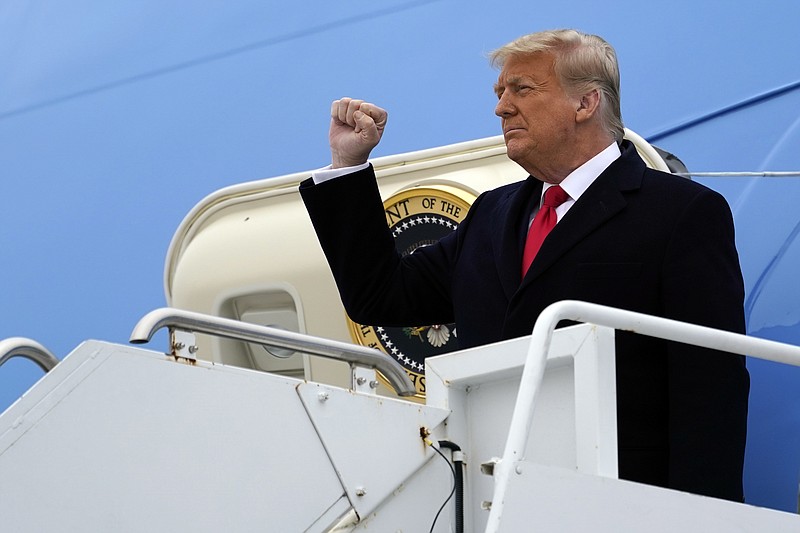Five years ago, with the approach of the Republican presidential primaries, discussions always seemed to include the question: "When will Trump start acting presidential?"
The thought, of course, was without doing so he would never win a presidential primary. Then it was that he would never lead the presidential primaries. Then never get the nomination. And never be elected.
Because Trump never deigned to act presidential on the hustings, we didn't endorse him in the 2016 primary, and he did not receive our endorsement for either the 2016 or 2020 general elections.
But to millions of others, he didn't need to act presidential to win their vote. And, though he won, he never did.
Nevertheless, we could support numerous policy agendas the Trump administration posited, from securing the borders to nominating constitutionalist judges to attempting new approaches in health care and foreign policy.
But, today, three days before he is officially supposed to leave office, we wonder what might have been had he ever acted presidential.
As counterintuitive as it might seem, Trump may never have been elected if he had acted presidential. Remember, there were plenty of wooden candidates who acted presidential, from former Florida Gov. Jeb Bush to Ohio Gov. John Kasich to former Texas Gov. Rick Perry.
But they didn't have the name recognition Trump did, weren't willing to speak honestly to the millions who felt forgotten by the Obama administration, and weren't willing to confront an increasing liberal and biased national media. As flawed a candidate as 2016 Democratic nominee Hillary Clinton was, she might have beaten many of Trump's wooden opponents.
Once Trump upset the favorite, though, he was never going to get an even shake from Democrats or the media. But if he'd acted presidential, he might have charmed them in the way Ronald Reagan did after winning the presidency in 1980.
Many will recall that Reagan, pre-election, was lambasted by Democrats and the national media because they thought he was a dunce and a bomb thrower. By the end of his two terms, he was praised by both.
We recall, for instance, being in the off-the-ropes audience at the opening of former President Jimmy Carter's library in Atlanta on Oct. 1, 1986, and hearing Carter praise Reagan: "I think I now understand more clearly than I ever had before why you won in November 1980, and I lost."
Trump, without the bombast, the insults and the need to have every last word, might have found common ground with Democrats on immigration and on the rebuilding of infrastructure.
Infrastructure, one of the issues he said he and Democrats should be able to agree on, never got off the ground. Minus who should do the work and who should pay for it, though, infrastructure was (and is) a bipartisan issue.
On immigration, he and Democrats drew reasonably close in early 2018. Trump had agreed to extend protection for the children who had been brought into the country illegally by their parents and said "we are not very far away" from full immigration reform.
Though a majority of Americans said they opposed the Affordable Care Act, he probably never was going to get Democrats to agree to dump the plan they unanimously agreed to under President Barack Obama. But a calmer, more compromising president might have found some additional ways to go forward with Democrats on health care.
We also think of the global pandemic that began to grip the nation in 2020 and Trump's response to it. Though there was disagreement on what to do by the nation's top epidemiologists and scientists, if the president had been a national cheerleader and encourager, avoided dispensing advice about cures and treatments, and rightly pushed to open the economy as soon as possible, the nation might have cheered him.
The economy in early 2020, after all, was humming, with the lowest employment in history for Blacks and Hispanics, less poverty and higher take-home pay for all. His attitude - acting presidential - might have meant the difference between re-election and defeat.
In the end, as with so many instances involving Trump, he was his own worst enemy. As much as he may have told himself he was putting the nation above himself, he constantly put himself above the nation. He had to be right, he had to have the last word, he had to be out front.
At this writing, we can't say for sure whether the president even will be in office when his term expires at noon on Wednesday. He might resign, be removed by Congress or be content to fly off to Mar-a-Lago the morning of the inauguration.
As Trump leaves, we can't help think of Richard Nixon, to date the only president to resign his office. We have quoted the words of his speech to the White House staff on the day of his resignation here before, but they perfectly fit for the denouement of the current administration: "[A]lways remember, others may hate you, but those who hate you don't win unless you hate them, and then you destroy yourself."
The 45th president never learned that.
